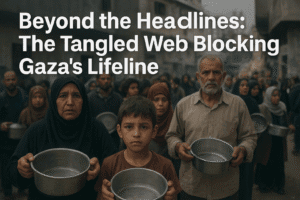Beyond the Headlines: The Tangled Web Blocking Gaza’s Lifeline
Over 100 aid organizations accuse Israel of “weaponizing aid” to Gaza through restrictive new rules, deepening starvation. Since March, groups like Oxfam and MSF report being blocked from delivering critical supplies unless they comply with stringent Israeli regulations, including providing detailed Palestinian staff data and avoiding actions deemed to “delegitimize” Israel. Most major NGOs state they’ve been unable to deliver any aid trucks since the rules began, with over 60 requests denied in July alone, stranding supplies like $7 million worth of rice for 6 million meals.
Israel denies restricting aid, asserting the rules prevent diversion to Hamas, citing 300 daily aid trucks from approved groups. However, this falls far short of the UN’s requirement of 600 trucks daily. The impasse has catastrophic human consequences: hospitals lack basics, and preventable deaths from starvation and illness are rising, including at least 106 children according to Gaza health officials. Aid groups face an impossible choice: comply with potentially compromising rules or abandon Gaza’s desperate population, while deep mutual distrust and conflicting claims about aid mechanisms like the Israeli-backed GHF – called a “death trap” by MSF – paralyze the response as famine takes hold.

Beyond the Headlines: The Tangled Web Blocking Gaza’s Lifeline
The stark image of displaced Palestinians holding empty pots speaks louder than any statistic. But behind this visceral symbol of hunger lies a complex bureaucratic impasse that humanitarian organizations warn is weaponizing starvation itself. While Israel cites security imperatives, over 100 aid groups paint a picture of a system strangling Gaza’s lifeline.
The Crushing Weight of New Rules:
Since March, international NGOs report facing a Kafkaesque reality. Israel introduced stringent regulations requiring organizations to register under new guidelines to maintain authorization for aid delivery. The process itself is a barrier, demanding detailed information on Palestinian staff – information that can be impossible to verify or obtain safely in a war zone. Crucially, the rules empower Israeli authorities to reject or revoke registration if an organization is deemed to “delegitimize” Israel or deny its democratic character.
The result? Organizations like Oxfam, Médecins Sans Frontières (MSF), and American Near East Refugee Aid (Anera) report being repeatedly told they are “not authorized” unless they comply. They claim:
- Most major INGOs haven’t delivered a single aid truck since March 2nd.
- Over 60 specific requests for essential supplies were denied in July alone.
- Anera has $7 million worth of aid – including 744 tons of rice for 6 million meals – stranded just kilometers away in Ashdod.
- Oxfam reports $2.5 million in goods blocked.
The Human Cost of Bureaucracy:
This isn’t just about trucks and paperwork. Aid workers describe the devastating downstream effects:
- Hospitals Without Basics: Critical medical supplies are not reaching facilities already decimated by bombardment and overwhelmed by casualties.
- Preventable Deaths: Children, the elderly, and people with disabilities are dying from malnutrition and illnesses easily treatable with adequate nutrition and medicine. The Hamas-run health ministry cites 235 deaths (including 106 children) from starvation-related causes.
- The “Weaponisation of Aid”: As Sean Carroll of Anera puts it, lifesaving supplies are “blocked.” MSF’s Chris Lockyear calls the situation “hanging on by a thread,” while their coordinator in Gaza, Aitor Zabalgogeazkoa, labels the current system a “militarised food distribution scheme” that has “weaponised starvation.”
Israel’s Security Imperative:
Israel firmly rejects accusations of restricting aid. Cogat, the military body coordinating aid, states:
- The rules are essential to ensure aid reaches civilians, not Hamas.
- Delays occur only when organizations refuse security requirements.
- Nearly 20 registered organizations are operating, facilitating roughly 300 aid trucks daily.
- Diaspora Minister Amichai Chikli asserts, “Unfortunately, many aid organisations serve as a cover for hostile and sometimes violent activity,” promising permission for groups without hostile ties.
The Impossible Chasm:
Herein lies the core conflict and the profound human insight:
- The Legitimacy Trap: Organizations fear compliance may force them into silence on Israeli policies they view as harmful, sacrificing their independence and advocacy voice (as Oxfam’s Bushra Khalidi warns). Yet, refusal means abandoning the desperate people they serve.
- Information in Chaos: Providing detailed, verifiable staff information in a shattered territory with collapsed infrastructure and mass displacement is often logistically impossible and potentially endangers staff.
- The Scale Gap: Even Israel’s claimed 300 trucks per day fall drastically short of the UN’s assessment that 600 are needed daily to avert famine. The blockage of major INGOs significantly hinders reaching this scale.
- Distrust & the “Death Trap”: Deep suspicion poisons the well. Israel distrusts NGOs, fearing Hamas infiltration. NGOs deeply distrust the new Israeli-controlled aid mechanisms like the Gaza Humanitarian Foundation (GHF), which MSF calls a “death trap” following UN reports of hundreds killed near its sites. Hamas denies diverting aid, further muddying the waters.
Beyond the Blame Game: The Stark Reality
While the mechanisms of blame are complex, the outcome on the ground is brutally simple. Bureaucratic hurdles, security fears, mutual distrust, and political calculations are converging to slow the trickle of aid to a pace utterly insufficient for human survival.
The empty pots held by Palestinians aren’t just symbols of immediate hunger; they are indictments of a system failing its most basic humanitarian imperative. As international bodies warn of an “unfolding famine” and “real starvation,” the question becomes not just about who is right about the rules, but whether any rules can justify preventable death on such a scale when the means to prevent it are visibly available, yet deliberately withheld by process. The human cost is measured not just in denied trucks, but in the fading breaths of children denied a simple meal.
You must be logged in to post a comment.